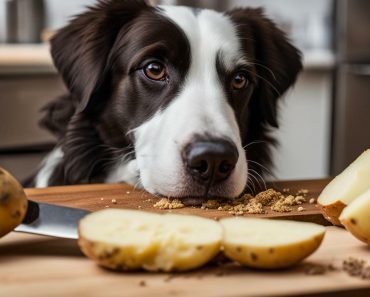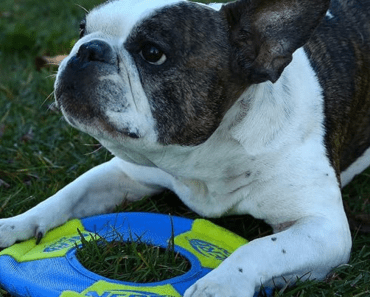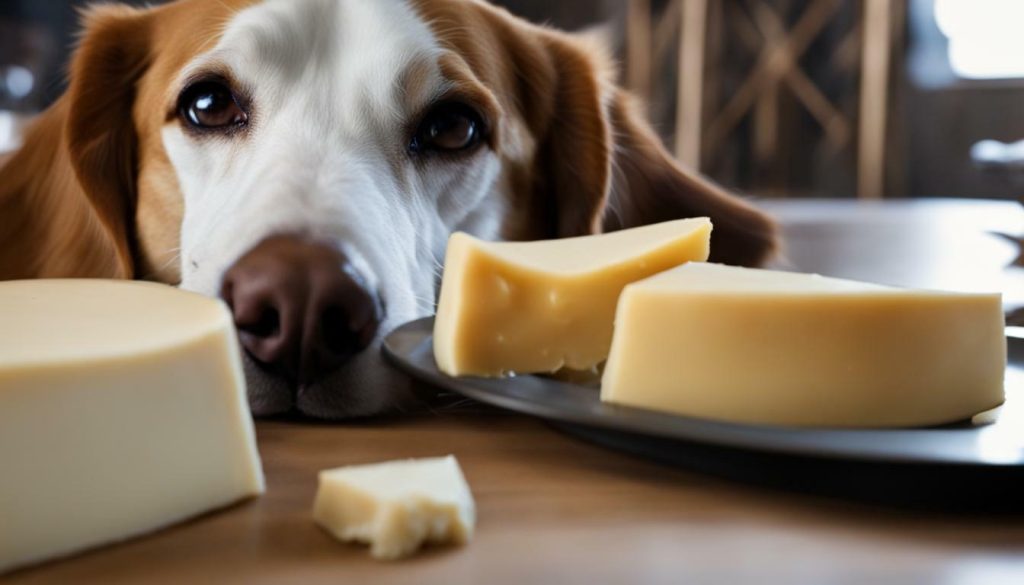
Many dog owners wonder if feeding their canine friend’s provolone cheese is safe, but is this popular cheese variety a suitable addition to their diet?
Provolone cheese can be safely consumed by dogs in moderation. It is low in lactose and carbohydrates, making it a suitable occasional treat. However, overfeeding provolone cheese can lead to digestive problems, pancreatitis, and weight gain in dogs. It is important to consult a veterinarian and monitor the dog’s tolerance before introducing provolone cheese into their diet. Other cheeses, such as cottage cheese, maybe a healthier dog alternative.
- Dogs can safely consume provolone cheese in moderation.
- Provolone cheese is low in lactose and carbohydrates, making it suitable for dogs.
- Overfeeding provolone cheese can lead to digestive problems, pancreatitis, and weight gain in dogs.
- Consult a veterinarian before introducing provolone cheese or any new food into a dog’s diet.
- Monitor your dog’s tolerance to provolone cheese and adjust portions accordingly.
- Consider healthier alternatives to provolone cheese, such as cottage cheese.
Understanding the Nutritional Content of Provolone Cheese
Provolone cheese is a semi-hard Italian cheese known for its distinct flavor, but what exactly does it offer in terms of nutrition for our four-legged companions? Let’s take a closer look at the nutritional content of provolone cheese to determine its suitability for dogs.
| Nutrient | Amount per 100g |
|---|---|
| Protein | 25g |
| Fat | 28g |
| Lactose | Trace amounts |
Provolone cheese is relatively high in protein, essential for maintaining strong muscles and supporting overall health in dogs. However, it also contains a significant amount of fat, so it should be given sparingly to avoid weight gain and related health issues.
One of the advantages of provolone cheese is its low lactose content, making it more tolerable for dogs with lactose intolerance. This can be particularly beneficial for those pooches who enjoy cheese taste but have difficulty digesting lactose.
While provolone cheese can be a tasty treat for your furry friend, it should always be in moderation. Excessive consumption can lead to digestive problems such as diarrhea and upset stomach. Additionally, the high-fat content in provolone cheese increases the risk of pancreatitis, a potentially serious condition in dogs.
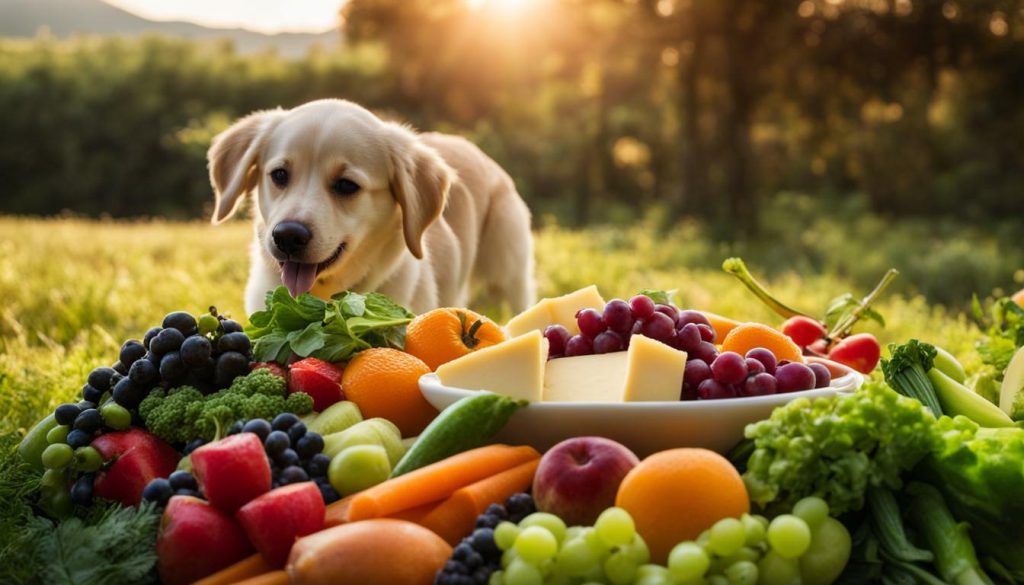
- Provolone cheese can be safely consumed by dogs in moderation.
- It is low in lactose and carbohydrates, making it a suitable occasional treat.
- Overfeeding provolone cheese can lead to digestive problems, pancreatitis, and weight gain in dogs.
- It is important to consult a veterinarian and monitor the dog’s tolerance before introducing provolone cheese into their diet.
- Other cheeses like cottage cheese may be a healthier dog alternative.
“As a responsible pet owner, it’s crucial to provide a balanced diet for your dog. While provolone cheese can be enjoyed by your furry friend, moderation is key to ensuring their overall health and well-being. Always consult with your veterinarian for personalized advice.”
Can Dogs Safely Consume Provolone Cheese?
Although provolone cheese may be deemed safe for dogs, it’s essential to understand the potential risks and precautions to consider before sharing this tasty treat with your furry friend. Provolone cheese is low in lactose and carbohydrates, making it a suitable occasional indulgence. However, overfeeding can lead to digestive problems, pancreatitis, and weight gain in dogs. Here are a few key factors to remember to ensure your dog’s well-being.
Portion Control and Moderation
When it comes to feeding provolone cheese to your dog, moderation is key. It should be given as an occasional treat in small portions. A little nibble can go a long way in satisfying your dog’s craving without negatively impacting their health. Dogs have different dietary needs and tolerance levels, so it’s crucial to tailor the portion size according to your dog’s breed, size, and overall health.
Consulting with a Veterinarian
Before introducing provolone cheese or any new food into your dog’s diet, it’s highly recommended to consult with a veterinarian. They can assess your dog’s dietary requirements and advise on portion control and frequency. A veterinarian will consider any pre-existing health conditions, allergies, or intolerances your dog may have, ensuring their safety and well-being.
Healthier Cheese Alternatives
If you’re looking for healthier cheese options for your dog, consider alternatives to provolone cheese. Cottage cheese, for example, is a nutritious substitute lower in fat and lactose. It can be a tasty addition to your dog’s diet while providing essential nutrients. Remember to introduce any new food gradually and monitor your dog’s response to ensure they tolerate it well.
| Key Takeaways: |
|---|
| • Provolone cheese can be safely consumed by dogs in moderation. |
| • Overfeeding provolone cheese can lead to digestive problems, pancreatitis, and weight gain. |
| • Consult with a veterinarian and consider healthier alternatives like cottage cheese. |
| • Monitor your dog’s tolerance and adjust portion sizes accordingly. |
Remember, while provolone cheese may be a delicious treat for humans, it’s important to prioritize your dog’s health and well-being by practicing responsible feeding habits. By making informed decisions and following veterinary guidance, you can ensure that your furry friend enjoys a safe and balanced diet.
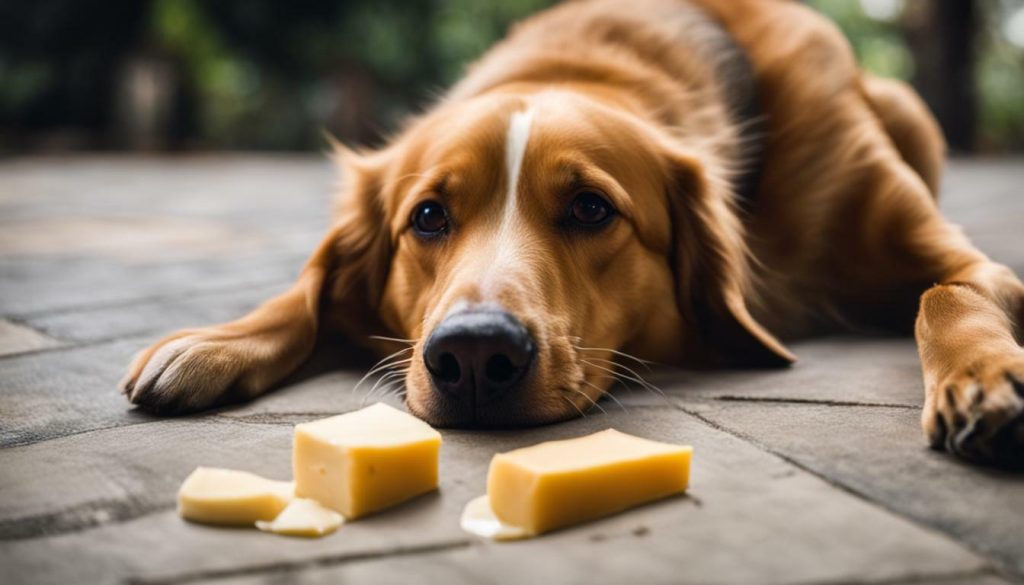
Lactose and carbohydrates are crucial in determining whether provolone cheese is safe for dogs to consume, and understanding their impact is vital for responsible pet ownership. Provolone cheese is relatively low in lactose, making it easier for dogs to digest than other dairy products. While some dogs may be lactose intolerant, provolone cheese is generally well-tolerated in small quantities.
Carbohydrates, on the other hand, are present in provolone cheese but in minimal amounts. This makes provolone cheese suitable for dogs with low-carb diets or specific dietary needs. However, it is essential to remember that dogs primarily require a protein-based diet, and provolone cheese should only be given as an occasional treat.
“A little provolone cheese as a treat can be a great way to bond with your dog, but excessive amounts can lead to health issues.”
It is important to note that while dogs can enjoy provolone cheese, overfeeding can lead to several health concerns. The high-fat content in provolone cheese can contribute to weight gain, which can have long-term effects on a dog’s overall health. Additionally, excessive consumption of provolone cheese can cause digestive problems such as diarrhea or upset stomach.
As a responsible pet owner, it is crucial to consult with a veterinarian before introducing provolone cheese or any new food into your dog’s diet. Each dog is unique and may have specific dietary requirements or sensitivities. Monitoring your dog’s tolerance to provolone cheese is also essential, as some dogs may react differently to certain foods. By seeking professional advice and observing your dog’s responses, you can make informed decisions about their dietary choices.
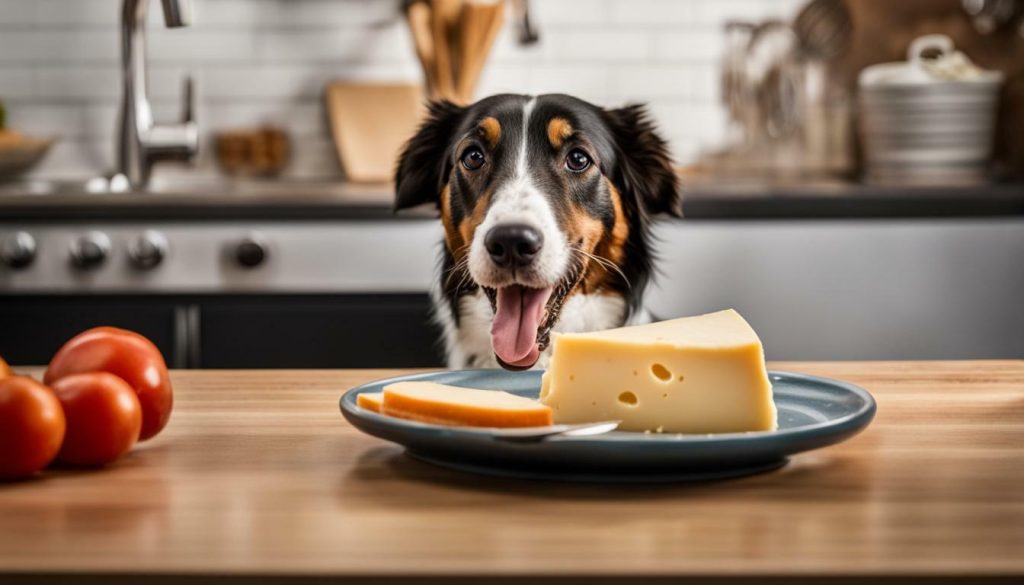
Feeding provolone cheese to your dog can be a delightful way to treat them, but it is crucial to understand that moderation and portion control are key to maintaining a balanced diet. While provolone cheese is generally safe for dogs to consume in small amounts, overfeeding can lead to potential health issues such as digestive problems and weight gain.
“As with any treat, it’s important to remember that provolone cheese should be given in moderation,” advises veterinarian Dr. Smith. “Excessive consumption can result in an upset stomach, diarrhea, or even pancreatitis, a potentially serious condition.”
To ensure your dog’s well-being, it is recommended to consult with a veterinarian before incorporating provolone cheese into their diet. A veterinarian can provide personalized advice based on your dog’s dietary needs and health conditions. They can also recommend suitable portions based on your dog’s size and breed.
Image:
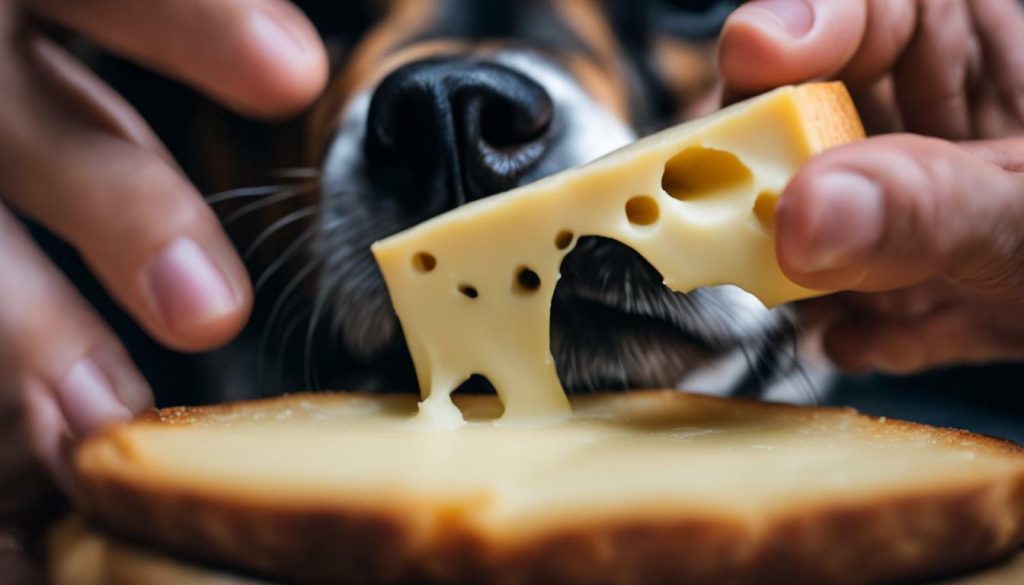
Additionally, monitoring your dog’s tolerance to provolone cheese is essential. Just like humans, dogs may have varying degrees of lactose intolerance. While provolone cheese is generally low in lactose, some dogs may still experience digestive discomfort. Watch for any signs of stomach upset or bowel movement changes after feeding your dog provolone cheese.
If you want healthier alternatives to provolone cheese, consider options like cottage cheese. Cottage cheese is lower in fat and lactose, making it a safer dog choice. Remember to introduce any new food gradually and monitor your dog’s response to ensure it agrees with their digestion.
Potential Risks and Side Effects of Feeding Provolone Cheese to Dogs
While provolone cheese can be a tasty treat for dogs, it is essential to be aware of the potential risks and side effects it may pose to their health. Feeding provolone cheese to dogs excessively or as a regular part of their diet can lead to various health problems.
One of the main concerns with provolone cheese is its high-fat content. Dogs that consume too much fat can develop pancreatitis, a condition characterized by pancreas inflammation. This can cause symptoms such as abdominal pain, vomiting, and loss of appetite.
Additionally, provolone cheese contains lactose, which may be difficult for some dogs to digest. When consuming provolone cheese, dogs with lactose intolerance may experience digestive issues such as diarrhea, bloating, and gas.
Furthermore, overfeeding provolone cheese can contribute to weight gain in dogs. Obesity in dogs can lead to a range of health problems, including joint issues, heart disease, and reduced lifespan.
Therefore, feeding provolone cheese to dogs in moderation and as an occasional treat is important. As with any new food, it is recommended to consult with a veterinarian before introducing provolone cheese into your dog’s diet. They can provide guidance specific to your dog’s individual needs and help you determine the appropriate portion size and frequency of feeding provolone cheese.
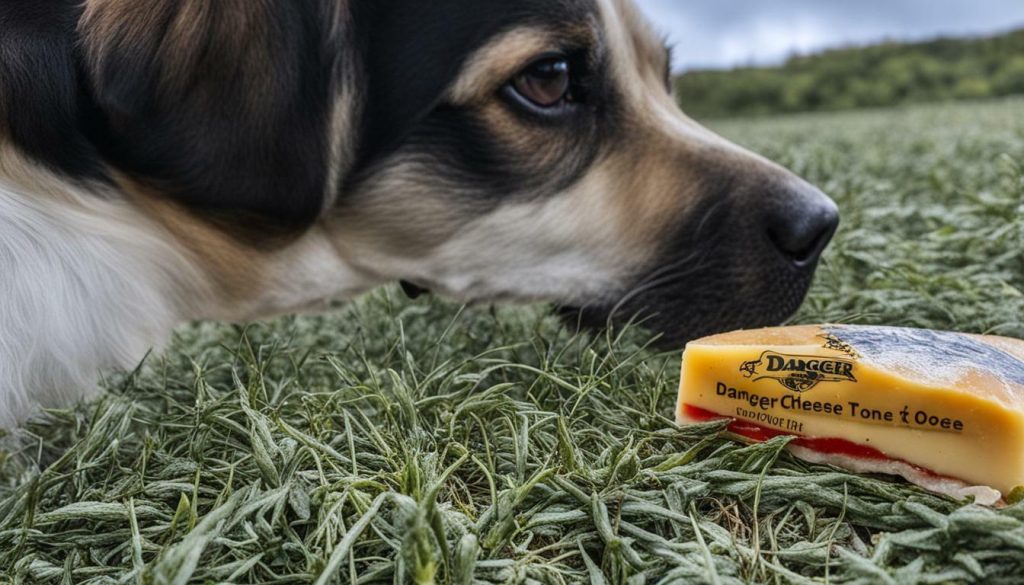
In conclusion, while provolone cheese can be a tempting treat for dogs, it is crucial to be mindful of the potential risks it may pose to their health. By practicing moderation and consulting with a veterinarian, you can ensure the well-being of your furry friend and make informed decisions about their diet.
| Potential Risks and Side Effects of Feeding Provolone Cheese to Dogs | Precautions |
|---|---|
| High-fat content | Feed in moderation to avoid pancreatitis |
| Lactose intolerance | Monitor your dog’s tolerance and watch for digestive issues |
| Weight gain | Control portion sizes and ensure a balanced diet |
Alternatives to Consider: Healthier Cheese Options for Dogs
If you’re concerned about the potential risks of feeding your dog provolone cheese, alternative cheese options may be healthier and more suitable for their dietary needs. One such option is cottage cheese.
Cottage cheese is lower in fat and lactose than provolone cheese, making it a safer choice for dogs. It is also a good source of protein, which is essential for their growth and development. When introducing cottage cheese into your dog’s diet, start with small portions and monitor their tolerance to ensure they don’t have any adverse reactions.
Another alternative to consider is low-fat cheddar cheese. It provides a similar taste profile to provolone cheese but with reduced fat content. However, like provolone cheese, it should be fed in moderation to avoid potential digestive issues.
While cheese can be a tasty treat for your dog, it should not replace their regular balanced diet. Always consult your veterinarian before changing your dog’s diet, especially if they have specific dietary restrictions or health conditions. Your veterinarian can provide personalized advice and recommendations based on your dog’s needs.
Healthier Cheese Options for Dogs:
| Cheese Option | Benefits |
|---|---|
| Cottage Cheese | Lower in fat and lactose, a good source of protein |
| Low-fat Cheddar Cheese | Reduced fat content, similar taste to provolone cheese |
Considering these alternative cheese options, you can provide your dog with a tasty treat while minimizing the potential risks of provolone cheese. Always prioritize your dog’s health and consult a veterinarian for guidance.

To ensure your dog’s well-being, it is crucial to consult with a veterinarian and closely monitor their tolerance when introducing provolone cheese or any new food into their diet. While provolone cheese can be enjoyed by dogs in moderation, it is essential to consider their individual needs and potential risks.
Consulting with a veterinarian is highly advised before incorporating provolone cheese into your dog’s diet. They can provide valuable insights into your dog’s dietary requirements and advise on suitable portion sizes. Additionally, they can help identify any underlying health conditions or allergies that may affect your dog’s ability to tolerate provolone cheese.
Once you have received guidance from your veterinarian, closely monitoring your dog’s tolerance to provolone cheese is important. Observe any changes in their behavior, digestion, or overall health after consuming provolone cheese. If you notice any adverse effects, such as vomiting, diarrhea, or discomfort, it may be a sign that your dog is not tolerating the cheese well.
Remember that moderation is key. While provolone cheese can be a tasty treat for dogs, overfeeding can lead to digestive problems, weight gain, and even pancreatitis. Including provolone cheese as part of a balanced diet and not exceeding the recommended portion sizes is important.
| Benefits | Risks |
|---|---|
|
|

“It is important to consult with a veterinarian before introducing provolone cheese or any new food into your dog’s diet. Each dog is unique and may have different dietary needs or sensitivities. Monitoring your dog’s tolerance and observing any changes in their health is crucial for their overall well-being.” – Dr. Amanda Wilson, Veterinarian
Conclusion
In summary, provolone cheese can be a treat for dogs, but responsible pet ownership requires careful consideration of portion sizes, moderation, and the individual needs of your canine companion.
Provolone cheese is generally safe for dogs to consume in small quantities. It is low in lactose and carbohydrates, which makes it a suitable occasional indulgence. However, overfeeding provolone cheese to your furry friend can lead to digestive problems, pancreatitis, and weight gain.
Before introducing provolone cheese or any new food into your dog’s diet, it is crucial to consult with a veterinarian. They can provide valuable insights into your dog’s dietary needs and recommend appropriate portions. Additionally, monitoring your dog’s tolerance to provolone cheese is essential, as dogs may react differently to certain foods.
If you are looking for alternative cheese options for your dog, consider cottage cheese. Cottage cheese is lower in fat and lactose, making it a healthier choice. It can be a safe and nutritious substitute for provolone cheese.
Remember, your dog’s overall health and well-being should always be top priorities. By practicing moderation, consulting with a veterinarian, and monitoring your dog’s tolerance, you can make informed decisions about their dietary choices and ensure they lead a happy and healthy life.
FAQ
Can dogs eat provolone cheese?
Yes, dogs can safely consume provolone cheese in moderation.
Is provolone cheese low in lactose and carbohydrates?
Yes, provolone cheese is low in lactose and carbohydrates, making it suitable for dogs in moderation.
What are the potential risks of feeding provolone cheese to dogs?
Overfeeding provolone cheese can lead to digestive problems, pancreatitis, and weight gain in dogs.
How much provolone cheese can I give my dog?
The amount of provolone cheese given to a dog should be determined based on their size and breed, and should be consumed in moderation.
Are there healthier cheese options for dogs?
Yes, cottage cheese is a healthier alternative to provolone cheese for dogs, as it is lower in fat and lactose.
Should I consult with a veterinarian before feeding my dog provolone cheese?
It is highly recommended to consult with a veterinarian before introducing provolone cheese or any new food into a dog’s diet.
How should I monitor my dog’s tolerance to provolone cheese?
It is important to observe your dog’s response to provolone cheese and monitor for any digestive issues or adverse reactions.



